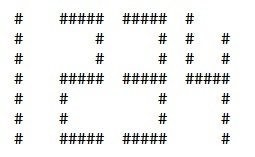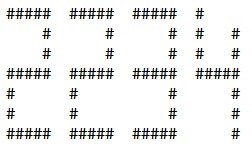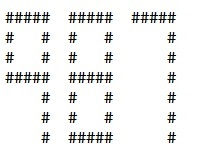
 Data Structure
Data Structure Networking
Networking RDBMS
RDBMS Operating System
Operating System Java
Java MS Excel
MS Excel iOS
iOS HTML
HTML CSS
CSS Android
Android Python
Python C Programming
C Programming C++
C++ C#
C# MongoDB
MongoDB MySQL
MySQL Javascript
Javascript PHP
PHP
- Selected Reading
- UPSC IAS Exams Notes
- Developer's Best Practices
- Questions and Answers
- Effective Resume Writing
- HR Interview Questions
- Computer Glossary
- Who is Who
C Program that receives a number and prints it out in large size
Given a number n in form of a string; the task is to print that following number in large using hash symbols.
Like we have provided a number “1234”
The representation of the following number should be −

Likewise we want our solution to be printed −
Example
Input: n[] = {“2234”}
Output:

Input: n[] = {“987”}
Output:

Approach we will be using to solve the given problem −
- Take at most 4 digit number a input in a string.
- Make arrays of every number one by one the large pattern we want for the number.
- Traverse the string and print every number one by one.
Algorithm
Start
Step 1 -> Define Height as 7
Step 2 -> Define W 8
Step 3 -> In function int large(char num[])
Declare variables i, j, k
Set char zero[H][W]={" ##### ", // H=0
" # # ",
" # # ",
" # # ",
" # # ",
" # # ",
" ##### "},
Set one[H][W]={" # ",
" # ",
" # ",
" # ",
" # ",
" # ",
" # "},
Set two[H][W]={ " ##### ",
" # ",
" # ",
" ##### ",
" # ",
" # ",
" ##### "},
Set three[H][W]={" ##### ",
" # ",
" # ",
" ##### ",
" # ",
" # ",
" ##### "},
Set four[H][W]={" # ",
" # # ",
" # # ",
" ##### ",
" # ",
" # ",
" # "},
Set five[H][W]={" ##### ",
" # ",
" # ",
" ##### ",
" # ",
" # ",
" ##### "},
Set six[H][W]={ " ##### ",
" # ",
" # ",
" ##### ",
" # # ",
" # # ",
" ##### "},
Set seven[H][W]={" ##### ",
" # ",
" # ",
" # ",
" # ",
" # ",
" # "},
Set eight[H][W]={" ##### ",
" # # ",
" # # ",
" ##### ",
" # # ",
" # # ",
" ##### "},
Set nine[H][W]={" ##### ",
" # # ",
" # # ",
" ##### ",
" # ",
" # ",
" # "}
If strlen(num) > 10
Print ”You must enter a number upto 10 digits”
Else
Print new line
Set k=1
Set j=0
While k <= 7
Loop For i=0 and i<strlen(num) and i++
If num[i] == '0' then,
Print zero[j]
Else If num[i] == '1’ then,
Print one[j]
Else If num[i] == '2' then,
Print two[j]
Else If num[i] == '3' then,
Print three[j]
Else If num[i] == '4' then,
Print four[j]
Else If num[i] == '5' then,
Print five[j]
Else If num[i] == '6' then,
Print six[j]
Else If num[i] == '7' then,
Print seven[j]
Else If (num[i] == '8')
Print eight[j]
Else If (num[i] == '9')
Print nine[j]
End For
Print newline
Increment k by 1
Increment j by 1
End While
End Else
Step 4 -> Declare int main()
Declare and initialize input char n[] = {"2168"}
Call function large(n)
Stop
Example
#include<stdio.h>
#include<string.h>
#include<stdlib.h>
#define H 7
#define W 8
int large(char num[]) {
int i, j, k;
// declaring char 2D arrays and initializing
// with hash-printed digits
char zero[H][W]={" ##### ", // H=0
" # # ", // H=1
" # # ", // H=2
" # # ", // H=3
" # # ", // H=4
" # # ", // H=5
" ##### "},// H=6
one[H][W]={" # ",
" # ",
" # ",
" # ",
" # ",
" # ",
" # "},
two[H][W]={ " ##### ",
" # ",
" # ",
" ##### ",
" # ",
" # ",
" ##### "},
three[H][W]={" ##### ",
" # ",
" # ",
" ##### ",
" # ",
" # ",
" ##### "},
four[H][W]={" # ",
" # # ",
" # # ",
" ##### ",
" # ",
" # ",
" # "},
five[H][W]={" ##### ",
" # ",
" # ",
" ##### ",
" # ",
" # ",
" ##### "},
six[H][W]={ " ##### ",
" # ",
" # ",
" ##### ",
" # # ",
" # # ",
" ##### "},
seven[H][W]={" ##### ",
" # ",
" # ",
" # ",
" # ",
" # ",
" # "},
eight[H][W]={" ##### ",
" # # ",
" # # ",
" ##### ",
" # # ",
" # # ",
" ##### "},
nine[H][W]={" ##### ",
" # # ",
" # # ",
" ##### ",
" # ",
" # ",
" # "};
if (strlen(num) > 10)
printf("
You must enter a number upto 10 digits.
Try again!
");
else {
printf("
");
k=1;
j=0; //controls H of each digit
while (k <= 7) //controls height {
for (i=0; i<strlen(num); i++) //reads each digit {
if (num[i] == '0')
printf("%s", zero[j]);
else if (num[i] == '1')
printf("%s", one[j]);
else if (num[i] == '2')
printf("%s", two[j]);
else if (num[i] == '3')
printf("%s", three[j]);
else if (num[i] == '4')
printf("%s", four[j]);
else if (num[i] == '5')
printf("%s", five[j]);
else if (num[i] == '6')
printf("%s", six[j]);
else if (num[i] == '7')
printf("%s", seven[j]);
else if (num[i] == '8')
printf("%s", eight[j]);
else if (num[i] == '9')
printf("%s", nine[j]);
}
printf("
");
k++;
j++;
}
}
return 1;
}
//main fucntion
int main() {
char n[] = {"2168"};
large(n);
return 0;
}
Output


Advertisements
